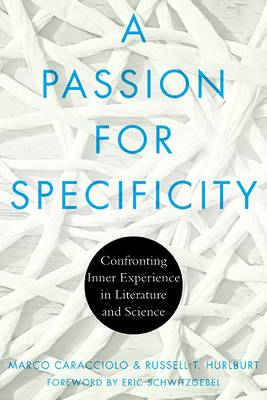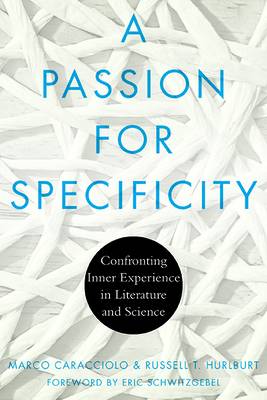
- Afhalen na 1 uur in een winkel met voorraad
- Gratis thuislevering in België vanaf € 30
- Ruim aanbod met 7 miljoen producten
- Afhalen na 1 uur in een winkel met voorraad
- Gratis thuislevering in België vanaf € 30
- Ruim aanbod met 7 miljoen producten
Zoeken
€ 66,45
+ 132 punten
Uitvoering
Omschrijving
In an analytical yet increasingly intimate conversation, A Passion for Specificity: Confronting Inner Experience in Literature and Science investigates the differences between experience as conveyed in literature and experience as apprehended through scientific method. Can experiences be shared? How much do language and metaphor shape experiential reports? Where is the dividing line between a humanistic and a scientific approach to experience? In a series of exchanges, Marco Caracciolo and Russell Hurlburt demonstrate that those are necessarily personal issues, and they don't flinch-they relentlessly examine whether Caracciolo's presuppositions distort his understanding of reading experiences and whether Hurlburt's attachment to the method he invented causes him to take an overly narrow view of experience. Delving ever more personally, they aim Hurlburt's experience sampling methods-beeping people to discover what was in their stream of inner experience at the moment immediately before the beep-at Caracciolo's own experiences, an exercise that puts Caracciolo's presuppositions to the test and leads him to discover things about experience (his own and literature's) that he had thought impossible. A Passion for Specificity, with its personal revelations, unexpected twists, and confrontational style, reads like an epistolary novel, but it is a serious exploration of ideas at the heart of literature and science. It is a thoughtful attempt at advancing the emerging "cognitive humanities," clarifying a number of core issues in the cross-pollination of literature, psychology, philosophy, and consciousness science.
Specificaties
Betrokkenen
- Auteur(s):
- Uitgeverij:
Inhoud
- Aantal bladzijden:
- 344
- Taal:
- Engels
- Reeks:
Eigenschappen
- Productcode (EAN):
- 9780814253755
- Verschijningsdatum:
- 16/12/2016
- Uitvoering:
- Paperback
- Formaat:
- Trade paperback (VS)
- Afmetingen:
- 152 mm x 229 mm
- Gewicht:
- 503 g

Alleen bij Standaard Boekhandel
+ 132 punten op je klantenkaart van Standaard Boekhandel
Beoordelingen
We publiceren alleen reviews die voldoen aan de voorwaarden voor reviews. Bekijk onze voorwaarden voor reviews.







